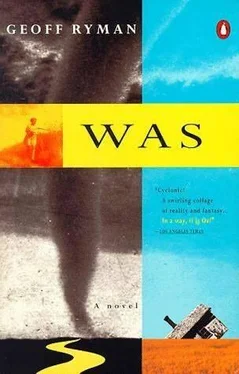People like you and me, Carol thought, we're better off in something like the Army, Billy. I can see you in the Army. I can see me there with you.
"There's nothing wrong with it." Billy looked impatient. There was a kind of light in his eyes that Carol didn't like, couldn't trust. "But I'd like… I don't know. I'd like some kind of qualification."
Big heart, thought Carol. If you've got such a big heart, what about saving some of it for me?
"What about us?" she asked him. She thought of white gloves, light pink fabrics, beaded purses, the smell of new hairdos. She thought of home.
"It shouldn't make any difference," Billy said.
It shouldn't, it shouldn't, she knew it shouldn't. But it did. The car was warm now, and the hot air coming through the heater smelled of something harsh and itchy. It made the back of their throats go dry. Billy coughed. Carol said nothing. There was something dry and hot and dark between them. Finally it was Billy who said it.
"Maybe it's a mistake getting married this young," he said.
A pause. There was such a slender bridge leading out into the darkness, and Carol saw herself on it in high heels and a black cocktail dress. Black for mourning. Nothing she had been taught was adequate to deal with this. She felt dirty somehow. She felt defenseless.
"Maybe so," Carol whispered, admitting defeat. She dreaded the shame that was to come, and the embarrassment of telephoning friends, of telling her aunts. She contemplated her coming freedom as well, with a lightening of the heart.
"Maybe, you know, it's just a bit too soon, what with the Army and all," said Bill, and coughed again.
That's what they would say to everybody, that they felt they were rushing into things because Billy was about to go off into the Army. She could say that they just felt maybe it was better to wait awhile. Carol could live with that. People would say how sensible they were being. They would know what was going on, but that wouldn't matter. The date for the marriage would be postponed, to some dim future, in some other life.
Goodbye, Billy, she thought. She saw autumn leaves in her mind. That's what he said, when he kissed her goodnight on her chaste doorstep. Goodbye, with something in his voice that had no promise of tomorrow.
About four months later, in the spring, Bill's church started a drive to collect funds for the Home. The Preacher knew what he was doing. The sight of some big ordinary kid like Bill in his Army uniform would be worth ten preachers.
There was a launch party with banners and free punch. Bill gave a speech. He kept it simple and short.
"It says somewhere in the Bible," he began, "that to approach Jesus you've got to be like a little child. Well, that's how some of the people in the Home are. I don't mean that some of them aren't unpleasant or even dangerous, because they are. But they see things differently than we do, and not always in a bad way."
He told the story, as best he could, of Dorothy Gael of Kansas. He told them what he knew of her childhood long ago amid the steam trains and peach orchards and school stoves that smoked and how she had stayed a child. He told the story of how she had died making angels in the snow, and how she went out singing hallelujah to the God she had cursed.
"You see something like that, you know we've all got something inside us," he told them, eyebrows slanting with pained honesty under his tiny Army hat. "We've all got something of worth, even those people in the Home, and they deserve just as good as we can give them."
Money? There was an avalanche of it. Turned out that Bill Davison had a talent for money as well.
Santa Monica, California-September 1989
Now we can cross the Shifting Sands. -L. Frank Baum's last words, May 6, 1919. The Shifting Sands border the East of Oz. Baum was seeing himself traveling westward toward it.
Years later, Jonathan was sitting in Bill Davison's office looking at photographs of athletes on the wall, and thinking of horror movies.
Jonathan starred in horror movies. The fear they generated seemed small and mean now, next to the real thing. You could only enjoy horror movies, Jonathan thought, when you were young and well and your fears had no name. Jonathan had a name for his terror now. He was dying.
The athletes in the photographs beamed at him, football players framed by a hunch of padding, hockey stars with missing teeth. They looked like gods of wholeness, gods of health.
Except that each of them had needed a psychiatrist. Bill Davison had made a fortune counseling athletes.
Football players who developed a terror of falling on Astroturf; baseball players who kept throwing out a knee, a knee that was medically perfect; rookies who developed such stage fright of crowds that they could not play. The photographs were signed with thanks.
Outside Bill Davison's office, Los Angeles gleamed. It was blue and white, blue with sky and smog, white with sunshine, white as bone. Both Jonathan and Bill were a long way from home.
Bill Davison was leaning back in his chair and regarding Jonathan with narrowed eyes. It was toward the end of their session.
"Right," he said. He rubbed the palm of his hand across his face. "Jonathan, I want you to try something new."
Bill Davison was nearly fifty, still handsome and broad-shouldered, though his face was creased and puffy and his chest sagged. His crewcut had been modified to suit later fashions. He wore a blue Lacoste shirt, casual and short-sleeved, that showed his football-player arms. Jonathan was rather in love with him. Counselor Bill, Jonathan called him, as if the whole sad business were a summer camp. It was appropriate. Jonathan had always hated summer camp. And loved his counselors.
Counselor Bill leaned forward on his desk and steepled his fingers. "I want you," he said, "to think of the place where you were happiest."
Jonathan did not try very hard. "I can't think of a place," he replied.
"Okay. Just think of something that you like, and try to remember where it happened."
Jonathan's thinking came slowly these days. Part depression and part drugs and part disease.
"I'm sorry, I just can't," he said.
"Where's home?" Bill Davison asked. His face looked very serious.
"Canada, I guess."
"Okay, Canada. Were you happy there?"
In school? As a little boy tearing up sheets? "How is this going to help the AIDS?" Jonathan asked.
"Maybe it won't help the AIDS, but it could help you."
Bill Davison had a direct approach. There was no time in the business of sports for psychoanalysis. In sports, with contracts worth thousands of dollars at stake, you had to intervene. Jonathan had read articles about Bill Davison. Bill would say to black tennis players who felt themselves adrift in a white man's world, "This is your game. This court here is your neighborhood. Think of it as your own street."
To football players who had suddenly grown angry at the ball, he would say, "Think of it as a woman. Imagine that it's the sweetest, kindest woman you ever met. Think of someone you knew. If it ended badly, then make it up to her this time. Catch the ball gently."
It worked. He had been criticized for merely treating symptoms.
"I can read The Power of Positive Thinking myself without Dr. Davison"; help," one psychiatrist had said. It turned out that Bill Davison was using visualization techniques fifteen years before anyone else. When the chemical pathway between conscious thought and the triggering of immune response was traced, it became, as they say, a whole different ball game.
Jonathan looked at Bill Davison and thought: You've been happy everywhere. What do you know?
"I don't know, on stage maybe, when I'm performing." Jonathan thought of the last play he had been in. "Oz," he said. "I was happy in Oz."
Читать дальше












